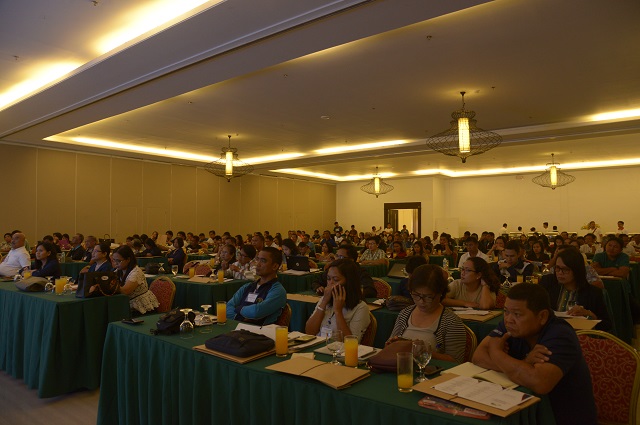Rice has always been a major food staple in the Philippines. Both producers and consumers consider a slight change in rice price as their major concern.
In light of the emerging issues in rice price, agriculture workers from different regions in the country gathered together in a seminar-workshop to understand the rice value chain, and craft localized agriculture interventions and strategies for their respective regions.
Participants crafted strategies that will target the strengthening and improvement of farm mechanization and postharvest facilities, farm to market roads, and marketing and price support. Other strategies target additional support for farmers’ irrigation and production needs, credit and crop insurance, and continuous research for development on rice.
This is in response to the high labor and land cost, high price of farm inputs, low yield and profitability, and low supply of palay which are identified as some of the major constraints in the rice value chain.
“To address these constraints, we recommend farmers to use and promote labor-saving, cost-reducing, and climate-smart technologies and practices to lower the per unit cost of paddy. Lower cost in palay production equates to lower price of milled rice.” Alice B. Mataia, a senior science research specialist from the Philippine Rice Research Institute (PhilRice) explained.
Using the value chain analysis, she also dissected the components of the total marketing costs of rice. She revealed that the biggest shares in the marketing cost of rice go to milling (17%), transportation (18%), and administrative (31%) expenses. These aspects contribute largely to the increase in the retail price of milled rice.
“Some segments in the rice value chain attach production and marketing inefficiencies and unnecessary additional costs to both producers and consumers. Hence, there is a need to use the rice value chain analysis as a tool to identify these segments and other constraints, and recommend intervention to bolster competitiveness in the rice value chain,” stated Mataia.
Mataia added that rice goes through a series of activities in the production of goods from raw materials to actual product sale. The rice value chain involves and links several key players at each stage of the process. Each player adds costs and profits to the original farm gate price of rice, thus, increasing its price as the product moves along the value chain towards the final retailers. Hence, understanding this process is crucial in crafting policies and strategies to achieve a competitive rice industry.
Specific strategies crafted by the participants are tailored-fit based on the needs of their respective regions. According to Myriam G. Layaoen, project leader of the Science-Based Policies in Advancing Rice Communities (SPARC) program, one of the purposes of the Seminar-Workshop on Rice Value Chain and Comparative Efficiency in the Philippines is to narrow the gap between research and actual practice for the benefit of rice farmers.
“We also want to enhance policymakers’ and other rice stakeholders’ awareness and use of science-based references in crafting and prioritizing policies that will help improve the country’s rice industry,” Layaoen highlighted.
This initiative is under PhilRice’s SPARC program which focuses on the creation and strengthening of “science-based and supportive policy environment” that will foster sound decisions on rice-related issues to help farmers reduce farm labor costs, narrow yield gaps, have easier access to farm credit.





